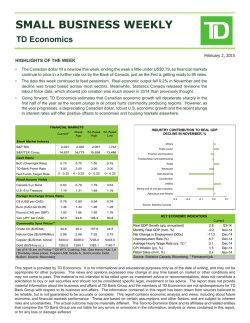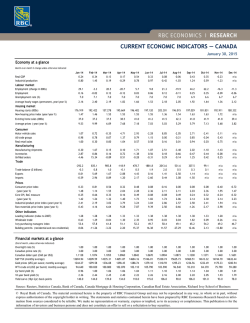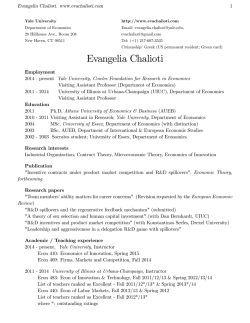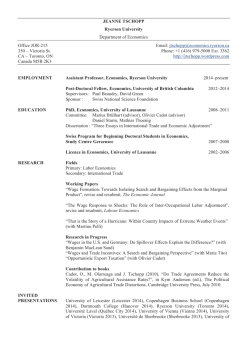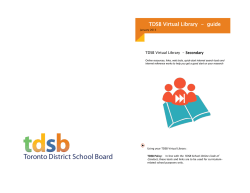
Section - Carleton University
Department of Economics ECON 3403 A Introduction to Public Economics: Expenditures Winter 2015 Instructor: Professor Sohrab Abizadeh Office: B851 Loeb Phone: 613-520-2600 extension 3752 Email: [email protected] OR [email protected] Office Hours: Tuesdays 2:45-3:45 pm or by appointment TA: TBA Course Description and Scope: This course introduces the student to the topics of public expenditure theory and its application. It traces out the micro and macro implications of government’s decisions. The course concentrates on current issues in Canadian Public Finance including such matters as the federal budget, fiscal policy and expenditure programs and policies. It critically examines the economic effects of these policies (past and present) within the context of the Canadian economy. Prerequisites: The prerequisite for this course is ECON 1000 or FYSM 1003 as outlined in the 20142015 Undergraduate Calendar. If you do not have the specific prerequisite and you believe that you have an equivalent background or a similar course from other university you must the Department of Economics. Textbook: ** Harvey S. Rosen, et al., Public Finance in Canada, 4th ed., McGraw-Hill Ryerson, Toronto, 2012. (Required) Sohrab Abizadeh and Mahmood Yousefi, Fiscal Systems and Economic Development: Case Studies of Selected Countries. Nova Science Publishers Inc., New York, 1996. (Not Required) **During the class lectures reference will be made to different articles and websites. Students are responsible to make note of these references and review them depending on the extent of emphasis put on each reference in the lecture. Also, for a comprehensive list of additional references related to public economics, see the list of books and articles attached. Introduction to Public Economics: Expenditures – ECON 3403 Page 1 of 9 Evaluation/Grading: In addition to the final exam there will be one midterm test and two assignments. Students who may not write the midterm test for legitimate reasons may have the weight of the midterm test transferred to the final, at the discretion of the instructor. There will not be a deferred midterm test in this course. Those who take the midterm test and are not satisfied with their performance may decrease the weight of the midterm and instead increase the weight of their final, after consulting with the instructor and before the final exam is administered. Those students who decide to increase the weight of their final exam must do so by sending an email to the instructor (see above for email address) by no later than one week before the final exam date. You MUST write the mid-term test in order to be able to take advantage of this option. Otherwise, you will receive a grade of zero for the mid-term with no possibility of changing the percentage of the final grade. It is clear that once you inform me of your decision regarding the percentage of your final, a formal and binding contract is in effect and there is no going back! You are expected to do both assignments otherwise you will receive a grade of zero for the assignment missed and the grade for your single assignment will be divided by two to be included in your final mark. There is a firm due date for each assignment. For every 24 hours passed the due date you will lose 5% of the mark on the late assignment. The course grade will consist of: Midterm Exam (35%) Final Exam (50%) Assignment (15%) Tuesday February 24, 2015 @ 11:35am As scheduled by the University Assigned during the term. Course Outline and Reading List: I. Introduction to the Theory of Public Finance 1. Notesa 2. Boadway (A.1997) II. Public Expenditure: Structure and Growth A. General 1. Abizadeh and Yousefi (T2)/Ch 1a 2. Abizadeh and Gray (A.1985)a 3. Saunders (A.1988)b B. Canada 1. 2. 3. 4. Rosen et al (T.1)/Ch 1a Abizadeh and Yousefi (T2)/pp 127-43a Abizadeh and Yousefi (A.1988)a Abizadeh and Gray (A.1993)b Introduction to Public Economics: Expenditures – ECON 3403 Page 2 of 9 III. Rationale for Government Activity A. The No-Government Economy 1. Notesa B. The All-Government Economy 1. Notesa C. The Real World Situation: The Government as an Economic Agent 1. Rosen et al (T.1), Ch 3 a D. Canadian Fiscal Institutions 1. Rosen et al (T.1), pp 4-8a 2. Damus (B.1992) selected readingsb E. Efficiency and Optimality a) Economic Heaven: The Concept of Pareto Optimality 1. Rosen et al. (T.1)/Ch 2a 2. Farrel (A.1987)a b) Market Failure: What may go wrong with the Market System? 1. Rosen et al. (T.1)/Ch. 5a 2. Bator (A.1958)b IV. The Theory of Public Goods and Government's Role A. Public Goods 1. Rosen et al. (T.1)/Ch. 4a 2. Samuelson (A.1955)c B. The Public Choice 1. Rosen et al. (T1)/Ch. 7a 2. Poterba (A.1998)a C. Natural Monopolies, User charges and Imperfect Competition 1. Rosen et al. (T.)/pp. 323-325a 2. Bird and Tsiopoulos (A.1997)a D. Public Sector and Efficiency Introduction to Public Economics: Expenditures – ECON 3403 Page 3 of 9 2. Notesa V. Theory of Optimal Income Distribution A. General 1. Rosen et al. (T1) Ch. 6a 2. Davies and Hoy (A.1995)b B. Canada a. Social Welfare Programs 1. Rosen et al. (T1)/ Ch. 12 a b. Employment Insurance 1. Rosen et al. (T1)/ Ch. 10 a c. Public Pension 1. Rosen et al. (T1)/ Ch. 11 a d. Health Care in Canada 1. Rosen et al (T1)/Ch 9a 2. Snoddon (A.1998)a e. Education 1. Rosen et al. (T1)/Ch. 13 a VI. Cost-Benefit Analysis A. Theory 1. Rosen et al (T1)/Ch 2 (only on the internet)a 2. Prest and Turvey (A.1965)a B. Application 1. Notesa 2. Vaillancourt (A.1987)a a b c Required Reading Recommended Readings Optional Readings Introduction to Public Economics: Expenditures – ECON 3403 Page 4 of 9 Abbreviations T=Textbook, A=Articles, and B=Books. Notes: 1. There will be no deferred mid-term exam in this course. If you miss it and provide a valid medical certificate, the assigned weight will be added to the final exam. Otherwise, you will receive zero marks. The mid-term exam will cover everything from the first class of the term up to, and including, the class prior to the exam. Final exam is comprehensive, i.e., it includes all the material covered in the course from the beginning of classes to the end. 2. Students must fulfill all course requirements in order to achieve a passing grade. Failure to write the final examination will result in a grade of ABS. In order to write a deferred final exam, students must contact the Registrar’s Office located in Tory Building. 3. Please be aware that plagiarism is a serious offense and it should be avoided. For further information regarding this subject, please see the Economics Departmental Web site. Requests for Academic Accommodations For Religious Obligations For Pregnancy To be worked out on individual basis with instructor. Consu Equity Services Website or an Equity Advisor (ext. 5622) fo Policy and list of Holy Days (www.carleton.ca/equity) Contact Equity Services (ext. 5622) to obtain letters of accommodations For Students with Disabilities: “Students with disabilities needing academic accommodations are required to contact a coordinator at the Paul Menton Centre to complete the necessary letters of accommodation. The student must then make an appointment to discuss their needs with the instructor at least two weeks prior to the first class test or ITV test. This is to ensure sufficient time is available to make the necessary accommodation arrangements. Please note the following deadline for submitting completed forms to the PMC for formally scheduled exam accommodations: March 6, 2015 for Winter term.” Introduction to Public Economics: Expenditures – ECON 3403 Page 5 of 9 List of References A. Articles Abizadeh, S. and John Gray, “Provincial Government Expenditures in Canada: An Empirical Analysis,” International Review of Applied Economics, Vol. 7(1), 1993 (69-90). Abizadeh, S. and M. Yousefi, “Growth of Government Expenditure: The Case of Canada,” Public Finance Quarterly, Vol. 16(1), January 1988 (pp. 78-100). Abizadeh, S. and John Gray, “Wagner's Law: A Pooled Time-Series, CrossSection Comparison,” National Tax Journal, Vol. 38, June 1985 (209-218). Bator, Francis M., “The Simple Analytics of Welfare Maximization,” American Economic Review, Vol. 47, 1957, (pp. 22-59). Bator, Francis M., “The Anatomy of Market Failure,” Quarterly Journal of Economics, Vol. 72, 1958, (pp. 351-79). Basley, T. and S. Coate, “Public Provision of Private Goods and the Redistribution of Income,” American Economic Review, Sept., 1991, (pp. 7979-984). Bird, Richard, M. and Thomas Tsiopoulos, “User Charges for Public Service: Potentials and Problems,” Canadian Tax Journal, Vol. 45, 1997, (pp. 25-86) Boadway, Robin, “Public Economics and the Theory of Public Policy,” Canadian Journal of Economics, Vol. 30, 1997, (pp. 753-772). Davies, James and Michael Hoy, "Making Inequality Comparisons When Lorenz Curves Intersect," American Economic Review, Vol. 85(2), 1995, (pp.980-86). Farrel, Joseph, “Information and the Coase Theorem,” Economics Perspectives, Vol. 1(2), Fall 1987, (pp. 113-129). Hadjimatheou, G., and Alex Tackie, “Modeling Public Expenditure: Empirical Evidence from Five Countries,” International Review of Applied Economics, Vol. 6, 1992 (pp. 65-87). Howard, R. C. Ruggeri and D. Van Wart, “The Progressivity of Provincial Personal Income Taxes in Canada,” Canadian Tax Journal, 1991 (pp. 288-308). Lipsey, R.G. and K. Lancaster, “The General Theory of the Second Best,” Review of Economics Studies, Vol. 24, 1956, (pp. 11-23). Poterba, James M., “Public Finance and Public Choice,” National Tax Journal, Vol. 51, 1998, (pp. 391-398). Prest, A.R. and R. Turvey, “Cost-Benefit Analysis: A Survey,” Economic Journal, Vol. 75, 1965, (pp. 683-735). Raynauld, Andre, “The Canadian Federation,” Canadian Journal of Economics, Vol. 27, No. 4, November 1984, (pp. 635-653). Ruggeri, G.C., and D. VanWart and R. Howard, “The Redistributional Impact of Taxation in Canada,” Canadian Tax Journal, Vol. 42, 1994 (pp. 417-451). Samuelson, P.A., “Diagrammatic Exposition of a Theory of Public Expenditure” Review of Economics and Statistics, November 1955 (pp. 350-365). Saunders, Peter, “Explaining International Differences in Public Expenditure: An Empirical Study,” Public Finance, Vol. 43, 1988 (pp. 272-294). Snoddon, Tracy R., “The Impact of the CHST on Interprovincial Redistribution in Canada,” Canadian Public Policy, March, 1998, (pp. 49-70). Vaillancourt, F., J. Carpentier and I. Henriques, “The Returns to University Education in Canada: a Rejoinder,” Canadian Public Policy, Sept. 1987, (pp. 389390). B. Books and Documents Banting, Keith G., Douglas M. Brown and Thomas J. Courchene, (eds), The Future of Fiscal Federalism. Kingston: School of Policy Studies, 1994. Bird, Richard M, The Growth of Government Spending in Canada. Toronto: Canadian Tax Foundation, 1970. , Financing Canadian Government: A Quantitative Overview. Toronto: Canadian Tax Foundation, 1979. , Fiscal Dimensions of Canadian Federalism. Toronto: Canada Tax Foundation, 1980. Boadway, Robin W., Intergovernmental Transfers in Canada. Toronto: Canadian Tax Foundation, 1980. Browning, E.K., and J.M. Browning, Public Finance and the Price System, (4th ed.). MacMillan, 1994. Buchanan, James M., and Marilyn R. Flowers, The Public Finances: Introductory Textbook (6th ed.). Homewood: Irwin, 1987. An Canadian Tax Foundation, Provincial and Municipal Finances 1989-90. Toronto: 1991. , The National Finances: An Analysis of the Revenues and Expenditures of the Government of Canada 1989-90. Toronto: 1991. Courchene, Thomas J. Refinancing the Canadian Federation: A Survey of the 1977 Fiscal Arrangements Act. C.D. How Research Institute. Damus, S., Canada's Public Sector: A Graphic Overview. Economic Council of Canada, 1992. Due, J.F. and A.F. Friedlaender, Government Finance: Economics of Public Sector, (7th ed.). Irwin, 1981. Hartle, Douglas G., The Revenue Budget Process of the Government of Canada: Description, Appraisal, and Proposals. Toronto: Canadian Tax Foundation, 1982. Luciani, Patrick, Economic Myths: Making Sense of Canadian Policy Issues. Addison Wesley Publishers, Don Mills, 1993. Lynch, Thomas, D., Public Budgeting in America, (4th ed.), Prentice Hall, NJ, 1995. Musgrave, R.A., The Theory of Public Finance. New York: McGraw-Hill, 1959. Musgrave, A. and C.S. Shoup (eds.), (edited for the American Economic Association), Readings in the Economics of Taxation. Homewood: Irwin, 1959. National Council of Welfare, The Hidden Welfare System. 1976. Ottawa: November , The Hidden Welfare System Revisited. Ottawa: March 1979. Perry, David B., Financing the Canadian Confederation, 1867 to 1995: Setting the Stage for Change. Toronto: Canadian Tax Foundation, 1997. Perry, J. Harvey. Background of Current Fiscal Problems. Toronto: Canadian Tax Foundation, 1982. Pechman, J.A. (ed.), What Should Be Taxed: Washington: Brookings Institution, 1980. Reuber, Grant L. (ed.), Canada's Political Economy: McGraw Hill, 1980. Ruggeri, G.C., The Canadian Economy: Toronto: Gage Publishing Ltd., 1981. Income or Expenditure? Current Issues. Toronto: Problems and Policies, (2nd ed.). Strick, J.C., The Public Sector in Canada: Programs, Finance and Policy, Thompson Education Publishing, Inc., Toronto, 1999. Strick, J.C., Canadian Public Finance, (4th ed.). Winston of Canada Ltd., 1992. Tresh, Richard W., Public Finance: Publications Inc., 1981. Toronto, Holt, Rinehart and A Normative Theory. Plano: Business Tuomala, Matti, Optimal Income Tax and Redistribution. Oxford: Clarendon Press, 1990. Wilson, Thomas A. and D. Peter Dungan, Fiscal Policy in Canada: An Appraisal. Canadian Tax Foundation, Toronto, 1993. Yalnizyan, Armine, The Growing GDP: A Report on Growing Inequality Between the Rich and Poor in Canada, Centre for Social Justice, Toronto, October 1998.
© Copyright 2026
